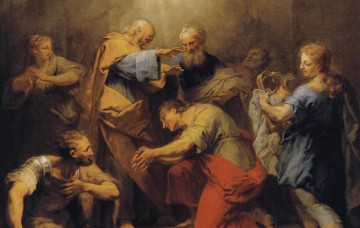Revealed to Stranger
God's will regarding what he wanted Paul (Saul) to do was, surprisingly, not initially revealed to him but to a complete stranger!
The conversion of Paul (Saul) begins when he is struck down and blinded on his way to Damascus. As he fasts and prays in the city the Lord recruits an unknown Jewish convert to Christianity named Ananias (Acts 22:12) to heal and baptize Paul.
Ananias at first balks at the task of meeting Paul as he is fully aware of his reputation for zealously persecuting Christians. God, however, not only commands he carry out his instructions but also reveals the threefold commission they will accomplish.

Then Ananias answered, "Lord, I have heard from many people about this man, how many evil things he has done to Your saints in Jerusalem . . .
But the Lord said to him, "Go, for this man is a chosen vessel to Me, to bear My name before the Gentiles, and kings, and the children of Israel . . ." (Acts 9:13, 15, HBFV throughout unless noted).
The Gospel to Gentiles
Apostle Paul, though he was a Jew, considered himself the apostle to the Gentiles.
I am speaking to you, the Gentiles, inasmuch as I am an apostle of the Gentiles - I magnify my service . . . (Romans 11:13, see also Galatians 2:7 and Ephesians 3:8).
Apostle Paul's tactic on his evangelistic journeys was to first visit, if it existed, a synagogue within a city. He did this, in part, due to the conviction that the Jews should be the first ones exposed to the gospel (Romans 1:16, 2:10, see also John 4:22). Then, as was many times the case, after the Jews rejected the gospel he turned and preached to the Gentiles.
It was necessary for the Word of God to be spoken to you (Jews) first; but since you reject it and do not judge yourselves worthy of eternal life, behold, we turn to the Gentiles (Acts 13:46, see also Acts 18:6).
As a result (of Paul's preaching), a great number of them believed, including not a few of the honorable Greek (Gentile) women and men (Acts 17:12).
Paul started predominantly Gentile churches in Pisidian Antioch (Acts 13:42 - 44), Thessalonica (Acts 17:1 - 4), Berea (verses 10 - 12), Corinth (18:8 - 10, 1Corinthians 4:15), Philippi (Acts 16:12 - 15), Ephesus (Acts 19) and other places. The apostle may have also been instrumental in starting a small church in Athens (Acts 17:32 - 34).
Even in prison Paul preached to the Gentiles. While under house arrest in Rome (Acts 28:30 - 31) he was able to proclaim the truth not only to the Roman Praetorian Guard but also to Caesar's household!
Now I want you to know, brethren, that my circumstances have turned out for the greater progress of the gospel, so that my imprisonment in the cause of Christ has become well known throughout the whole praetorian guard and to everyone else . . . (Philippians 1:12 - 13, NASB, see also 4:21 - 22).
The Gospel to Kings
Paul began to fulfill the second part of his threefold commission when he preached the gospel before Roman Governors Felix and Festus while he was a prisoner in Caesarea (Acts 24 - 25). He also took advantage of this "opportunity" to preach the gospel to King Herod Agrippa II, a great-grandson of Herod the Great (Acts 25 - 26).
Paul would get his chance to preach before Emperor Nero when he, as a Roman citizen, asserted his right to have him hear his case.
But Paul said, "I stand before the judgment seat of Caesar, where I have the right to be judged. I did nothing wrong to the Jews as you very well know . . . I appeal to Caesar." (Acts 25:10 - 11, HBFV).
For there stood by me this night an angel of God, Whose I am and Whom I serve, saying, 'Have no fear, Paul. You must stand before Caesar . . .' (Acts 27:23 - 24, HBFV).
Several years later, in 67 A.D., Apostle Paul is again arrested and taken to Rome. His second opportunity to appear before Nero, in 68 A.D., is attested to in the final verse of 2Timothy. This appearance, however, will lead to his martyrdom around May or June of the same year.
. . . The second epistle unto Timotheus, ordained the first bishop of the church of the Ephesians, was written from Rome, when Paul was brought before Nero the second time. (2Timothy 4:22, KJV).
The Gospel to Israel
Paul, of course, preached the gospel to the Jews who were composed of the Israelite tribes of Levi, Benjamin and Judah. In his journeys He also preached to the other tribes of Israel who were scattered around the Roman world (see James 1:1).
Conclusion
The Apostle Paul, after a ministry that lasted 35 years, fulfilled the threefold commission given to him by God. He not only raised up churches in the provinces of Galatia, Asia, Achaia and Macedonia, he also boldly proclaimed the truth to fellow Israelites and to kings.